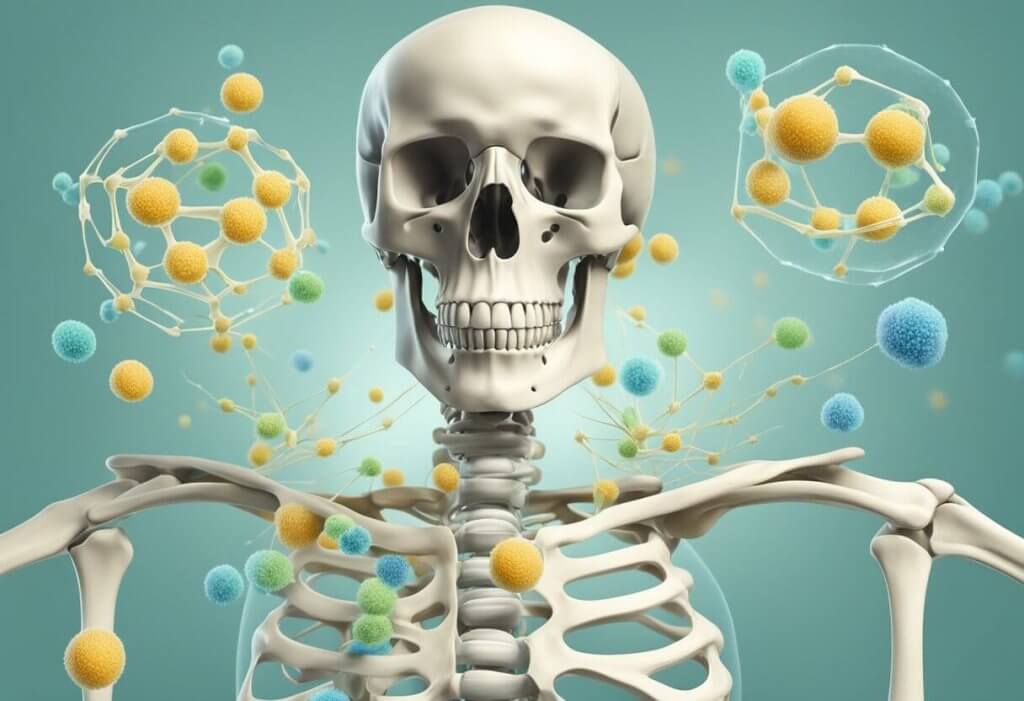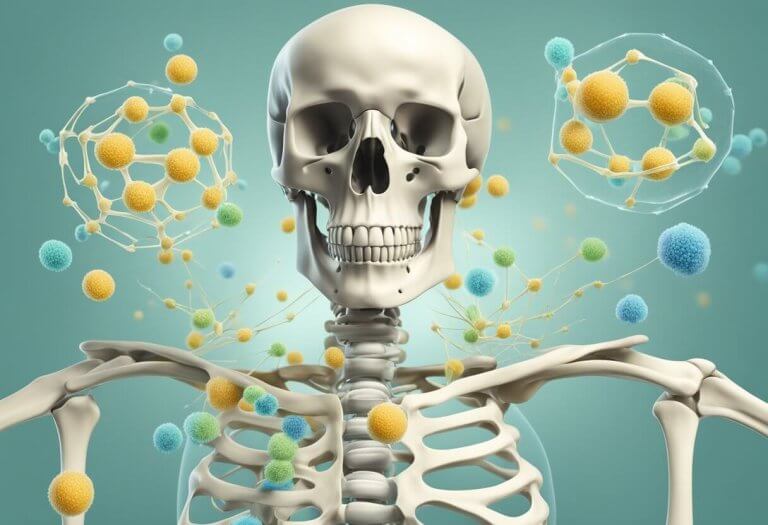Exploring Potential Benefits
Disclaimer: The anecdotal benefits of CBD mentioned on this website are based on preliminary research and individual user experiences. All information presented here is not meant to substitute for or replace information from health care practitioners. Please click here for our full disclaimer, including side effects, FTC position, etc.
As millions grapple with the challenges of maintaining strong, healthy bones, many seek alternatives to traditional treatments that often have unwanted side effects.

Bone health is a critical aspect of overall well-being, yet it’s a concern that often goes unaddressed until problems arise. Whether you’re dealing with the discomfort of osteoarthritis, the increased fracture risk associated with osteoporosis, or simply looking to maintain healthy bones as you age, you’re not alone in your search for effective solutions. While conventional treatments can provide some relief, they often come with limitations and potential drawbacks that leave many seeking a more natural approach.
This is where CBD, or cannabidiol, enters the picture. As a key component of the cannabis plant, CBD has garnered significant attention for its wide range of potential health benefits, including its impact on bone health. With a growing body of research suggesting that CBD may play a role in strengthening bones and promoting overall bone health, it’s no wonder that more and more people are turning to this natural compound as a complementary approach to their bone health regimen.
In this article, we’ll explore the science behind CBD’s potential bone health benefits and dive deeper into the question, “Does CBD strengthen bones?” We will provide you with the information you need to make an informed decision about incorporating CBD into your wellness routine.
For a comprehensive look at the potential advantages of this remarkable compound, be sure to explore our in-depth guide on the benefits of CBD.
Key Takeaways
- CBD interacts with the endocannabinoid system, affecting bone density.
- Studies suggest CBD may enhance bone formation and healing.
- CBD’s modulation of bone resorption and formation could indicate potential benefits for bone strength.
Potential Bone Benefits of CBD
| Benefit | Mechanism |
|---|---|
| Stimulates Bone Formation | Promotes osteoblast (bone-building cell) activity |
| Enhances Fracture Healing | Improves collagen crosslinking and callus strength |
| Reduces Bone Loss | May inhibit excess osteoclast (bone-resorbing cell) activity |
| Fights Oxidative Stress | Antioxidant effects protect bone cells |
Recent research suggests that CBD may positively affect bone strength, possibly improving bone healing and promoting the growth and strengthening of bone.
Initial studies indicate that CBD could enhance the function of osteoblasts, the cells responsible for bone formation, while also modulating the activity of osteoclasts, the cells involved in bone resorption.
This balance between creating and breaking bone tissue is crucial for maintaining strong bones.
Understanding CBD and Bone Health

Interest in cannabidiol (CBD) as a potential treatment for bone-related conditions has grown, with studies investigating how CBD may influence bone health and the recovery process after fractures.
The Role of the Endocannabinoid System in Bone Metabolism
The endocannabinoid system (ECS) plays a critical role in maintaining bone metabolism—the balance between the actions of osteoblasts and osteoclasts. These cells are responsible for bone formation and resorption, ensuring bone homeostasis. The ECS influences bone metabolism through CB1, CB2, and GPR55 receptors.
While CB1 receptors are more commonly associated with the brain and nervous system, CB2 receptors are found in bone tissue, which is believed to affect the activity of osteoblasts and osteoclasts.
“Our research has shown that CBD, the major non-psychoactive component in cannabis, has a positive impact on fracture healing by stimulating the work of specialized bone cells.” (Source)
Dr. Yankel Gabet, Bone Research Lab, Hebrew University
CBD’s Effects on Osteoporosis and Bone Mass
Research into CBD’s effects on osteoporosis and bone mass suggests that CBD may support bone health by interacting with the ECS, particularly the CB2 receptor. This interaction potentially encourages the formation of new bone cells, which could be beneficial for individuals with low bone density, a hallmark of osteoporosis, especially as they age or undergo menopause. CBD oil may promote fracture healing and bone healing via a similar mechanism.
Although promising, data are still developing, and such effects are primarily documented in preclinical models. It’s important to note that while supplements, including CBD, may complement health regimens, vitamin D and calcium remain essential nutrients for bone strength, as emphasized by the National Osteoporosis Foundation.
Studies also indicate that CBD might directly affect bone mineral density. However, unlike THC, the psychoactive component of cannabis, CBD doesn’t produce mind-altering effects, which expands its appeal as a therapeutic option.
Despite the potential, anyone considering CBD for osteoporosis or other bone-related issues should consult healthcare professionals, given the complexity of bone metabolism and the necessity of personalized treatment approaches.
Practical Applications and Considerations

When using CBD for bone health, practical applications can be tailored to individual needs, as well as considerations regarding safety and complementary lifestyle choices.
Fact: CBD has been shown to promote fracture healing and collagen cross-linking, which provides the structural basis for new bone formation.
https://www.sciencedaily.com/releases/2015/07/150716124359.htm
Using CBD for Bones: Dosage, Safety, and Administration
Dosage: Finding the right CBD dosage is crucial, as individual needs can vary widely. For bone health, particularly in cases involving fractures or chronic pain, users might start with a lower dose and adjust gradually. It’s essential to consult healthcare providers to tailor the dosage to specific conditions and avoid interference with other medications.
Safety and Administration: CBD is generally considered safe, but one must be mindful of potential side effects like fatigue, changes in appetite, or interactions with other drugs. CBD comes in various forms such as oils, capsules, creams, balms, and gummies. Oils and capsules may offer more precise dosing options, while creams and balms can be applied directly to areas affected by back pain or inflammation for localized relief.
Supportive Therapies and Lifestyle Choices for Bone Strengthening
Exercise and Therapy: Incorporating weight-bearing exercises can complement the anti-inflammatory properties of CBD, enhancing bone density and reducing the risk of fractures. Physical therapy might also be recommended for more targeted pain relief and improved mobility.
Diet and Nutrition: A balanced diet is integral to bone health. Ensuring adequate intake of calcium, vitamin D, and other nutrients is necessary to support bone strength. Specific dietary habits, including the consumption of anti-inflammatory foods, can work synergistically with CBD to provide natural remedy options for symptoms of bone-related conditions.
Maintaining a healthy lifestyle, which encompasses regular exercise, proper nutrition, and possibly the addition of CBD, could contribute to overall bone health and mitigate symptoms such as chronic pain and inflammation.
However, discussing such strategies with a healthcare professional is always advisable, especially when considering integrating new supplements or making significant changes to one’s diet or exercise regimen.
Promising Study: A 2015 study found that CBD markedly enhanced the biomechanical properties of fracture calluses and improved functional fracture healing in rats.
https://pubmed.ncbi.nlm.nih.gov/26450005/
Frequently Asked Questions
Exploring the relationship between CBD and bone health, the following frequently asked questions dive into specific areas of interest, revealing how CBD might influence bone healing and density.
Can CBD help with the healing process of broken bones?
Research indicates that CBD may aid the healing of broken bones. Animal studies, such as those mentioned by Healthline, suggest that CBD can activate cannabinoid receptors that play a role in bone healing.
What’s the impact of CBD on bone density and growth?
CBD’s impact on bone density and growth remains under investigation. Some preclinical data suggest it could positively affect bone metabolism via its interaction with the endocannabinoid system.
Does using CBD cream contribute to repairing fractures?
Some evidence suggests that topical CBD products could support fracture repair, but this needs to be substantiated through more comprehensive human clinical trials.
Are there any benefits of CBD for managing osteoarthritis symptoms?
CBD has been studied for its potential anti-inflammatory properties, which, as noted by CFAH, could offer symptom relief for individuals with osteoarthritis. However, its specific benefits for managing this condition require further research.
Could CBD use potentially assist in mitigating osteoporosis?
As osteoporosis involves weakening bones, CBD’s possible role in promoting bone health could be beneficial. Insights from Dr. Perlmutter suggest it may contribute to maintaining or improving bone density.
How does consuming CBD edibles influence post-surgery bone recovery?
The effects of CBD edibles on post-surgery bone recovery are not well-documented. Anecdotal evidence suggests benefits. However, more scientific research is necessary to understand the extent of its influence.
Success Story: “After breaking my wrist, I started taking CBD oil to help with the pain and inflammation. What I didn’t expect was that my orthopedist said my X-rays showed the fracture was healing faster than normal!”
Derek M., 32
